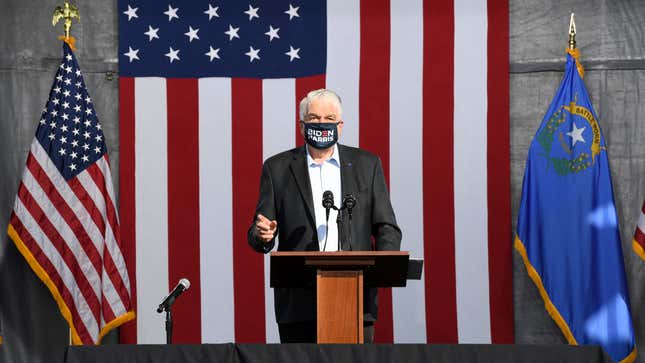
Nevada Governor Steve Sisolak has backtracked on legislation plans that would have allowed tech companies to form autonomous “Innovation Zones” anywhere in the state, reports The Nevada Independent. Instead of allowing categories of tech companies, including blockchain and internet of things, to create what are essentially their own local governments, Sisolak said he’s turning his idea into a proposed study instead.
With less than 40 days remaining in Nevada’s current legislative session, and the covid-19 pandemic throwing extra logistical and technological hurdles into the mix, there isn’t enough time to fully address concerns from key groups or agencies like tribal leaders, water authorities, environmental groups, and labor organizations, just to name a few.
“Innovation Zones is a bold proposal for our state that deserves additional attention and discussion,” said Sisolak in a statement released this morning. “I know that legislators, stakeholders and Nevadans still have questions, and I want those questions to be discussed and answered.”
Sisolak is proposing the Nevada legislature create a special joint committee with its own staff and budget, hold a minimum of one public meeting a month, and submit its findings and recommendations to the Legislative Commission and the Governor no later than Dec. 31, 2021.
Based on the rest of the proposal, the earliest that the Nevada legislature could potentially vote on any draft or finalized bill is prior to the 2023 regular session, which usually starts at the beginning of February. That will all depend on how much process the special joint committee makes between now and the end of the year—and assuming a special joint committee is even formed.
In February, at the start of the current legislative session, the Las Vegas Review-Journal originally reported that Sisolak proposed a draft of the bill to the legislature but did not formally introduce it. Still, speaking with the Reno Gazette-Journal, Sisolak said he hoped that would be enough time for the legislature to vet the draft of the bill. But given the complexity of the project, and the number of stakeholders involved, Sisolak said he’s not sure whether amendments could make the idea of autonomous tech zones feasible; the proposed draft was originally met with intense skepticism from several rural counties, Democratic lawmakers, and tribal and environmental groups. Storey County, for instance, formally opposed Sisolak’s “smart city” idea.
There are a lot of issues (or big red flags) that need sorting before any kind of headway could be made on such a dystopian-sounding project. Tax breaks would be an obvious draw for these companies, but creating a separate local government would give them the power to create and manage things only local governments typically have the power to do, like establish schools and school districts, court systems, taxes, boards of supervisors, and so on.
Any local ordinances that a board of supervisors establishes within the Innovation Zone would presumably cancel out the rules of the county, so essentially these companies could do whatever they want to some degree. Innovation Zones would be allowed to establish their own district attorney, county clerk, and sheriff, for instance, but at least they wouldn’t be able to levy property taxes, according to the draft bill. I’m sure most of us have read enough cyberpunk fiction to know how many ways giving tech companies the power to do something like this could go horribly wrong, so it’s a good thing Nevadans will have more time to weigh in.